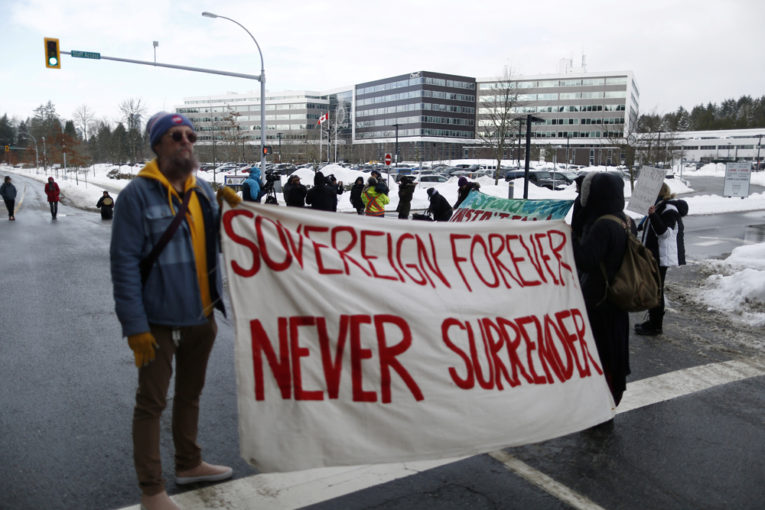
CALGARY – RCMP said Wednesday they are prepared to remove a group of Wet’suwet’en hereditary chiefs who are blockading work on the $6.6-billion Coastal GasLink pipeline.
“As enforcement of the injunction nears, we’ve assembled a team in the area,” Eric Stubbs, RCMP assistant commissioner, criminal operations officer, told a late-afternoon news conference. He did not say when police would move on the blockade.
Stubbs said RCMP would allow protestors to leave the area or, if they chose to be arrested, could choose to do so with minimal force. “There are peaceful options that will involve a minimal use of force,” he said.
However, Stubbs said RCMP would also be prepared to make arrests using commensurate force based on the actions of the opposed Wet’suwet’en hereditary chiefs in the area. He said the RCMP would be filming the event with body cameras, hand-held cameras and from the air.
All sides involved in the standoff in northern B.C. expected RCMP action after talks between the province and the opposed Wet’suwet’en hereditary chiefs broke down this week after just two days of what had initially been scheduled as seven days of meetings.
“We hope that the paramount need for safety stays the top priority for all parties,” said B.C. Indigenous Relations and Reconciliation Minister Scott Fraser in a release issued late Tuesday night.
“We and the Wet’suwet’en hereditary chiefs made a committed effort to find a peaceful resolution to the situation,” Fraser said, adding the two sides did not reach an agreement but the province remains open to further discussion.
Similarly, Coastal GasLink said in a statement it was disappointed that discussions did not result in a solution “that would prevent the enforcement of the interlocutory injunction order.”
The company and opposed First Nations leaders had previously come to an access agreement for the area, but that was scrapped last month as tensions escalated in the region.
Coastal GasLink — a venture jointly owned by Calgary-based TC Energy Corp., Alberta Investment Management Corp. (AIMCo) and New York private equity giant KKR & Co. LP — won an expanded injunction order from the Supreme Court of British Columbia in December.
Since then tensions in the region have steadily risen. Opposed Wet’suwet’en chiefs issued an eviction notice in early January to the company, resulting in delays to the pipeline’s construction schedule in the area as Coastal GasLink delayed the deployment of workers to a nearby camp.
At this point, the company has hired 1,000 people working to build the project between Dawson Creek and Kitimat, B.C. to deliver natural gas from northeastern B.C. to the $40-billion LNG Canada export project, which is currently under construction on the coast.
None of those workers are currently deployed near Houston, B.C., where the group of opposed Wet’suwet’en chiefs have blockaded a forestry road.
“As communicated last week, Coastal GasLink needs to quickly resume construction activities in the area to meet our commitments to LNG Canada, the province of British Columbia, our Indigenous partners, local communities and the many workers who depend on the opportunities our project provides,” the company said.
Coastal GasLink president David Pfeiffer said last week the company did not have a specific deadline for construction resuming in the area. However, the company now says it’s looking to deploy workers in the coming days.
“In the coming days, Coastal GasLink will resume construction activities in the Morice River area in accordance with our permits and interlocutory injunction,” the company said in its release Tuesday.
For its part, the group of Wet’suwet’en hereditary chiefs blockading the project also expected “imminent” RCMP action after talks broke down.
“Wet’suwet’en Hereditary Chiefs’ concerns are that safety be a priority for all Wet’suwet’en,” the group said in a statement.
On social media the group of opposed hereditary chiefs have posted pictures of temporary fences erected around a community centre in Houston, B.C., and multiple trucks parked in the parking lot. The group has speculated that a large RCMP contingent has been staying in the community centre amid the stand off.
The RCMP has been conducting patrols through the area and in January posted photos of felled trees, partially felled trees and stacks of tires filled with kindling and cans of fuels like gasoline in the blockaded area. At the time, police said they were opening a criminal investigation over the setting of traps likely to cause injury.
After those photos were posted, the RCMP set up a checkpoint along the contested Morice River Forest Service Road, limiting access to the area.
The standoff has also exposed divisions on resource development among First Nations in British Columbia, as Coastal GasLink has signed agreements with the elected chiefs and councils of all 20 Indigenous groups along the pipeline route.
“We agree that human rights are not a numbers game, but the majority of Indigenous leaders have chosen to consent to the project,” First Nations LNG Alliance CEO Karen Ogen-Toews said in a news release issued in the middle of the standoff.
Financial Post
• Email: [email protected] | Twitter: geoffreymorgan
You can read more of the news on source
